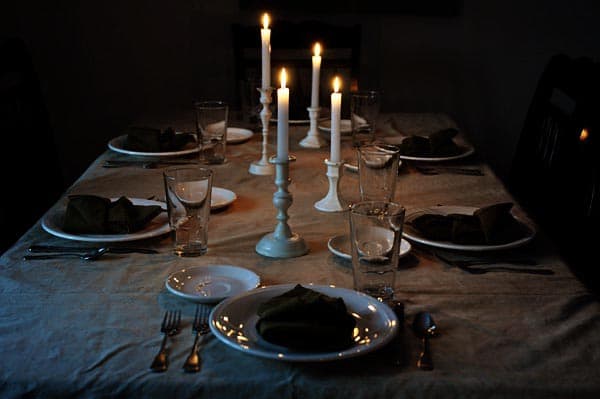What does the call of the Christian gospel require?
At its most basic level, it amounts to a change of belief. We used to think one thing. Now, because of Jesus, we think another–namely, that Jesus died for our sins, rose from the dead, and ascended into heaven from whence we await his return. Good news indeed! But what’s that mean for life right now? Obviously, we should abstain from egregious sins, but don’t we have gospel freedom to live how we want? Hence Christianity seems to entail a consumer ethic: we don’t buy explicitly evil things, and when we’re feeling nice, we may even buy a shirt with a catchy Christian phrase: “Wanna Taco About Jesus?” or “Ketchup with Jesus.” Other than that, we make enough money, so it’s our right to spend it as we wish—as long as we don’t go into debt, of course.
I was raised in a Christianity that was very comfortable. The above reductionist gospel is the gospel that I knew. Because of this deformation, John Piper and David Platt offered the only corrective I knew. They called me out of comfort and into something more for Christian life. Piper calls for people to get off the luxury cruise liner and join the military battle vessel. Cut out the excess; we’re in wartime. Prayer is not an intercom beckoning your personal butler; it’s a walkie-talkie on the front lines. Platt cuts the church’s budget for coffee and goldfish so we can give more to missions. The gospel makes a radical call on our life, and the way we live ought to reflect the Kingdom of God, not the American dream.
These are the two contrasting moral ecologies with which I grew up into Christ. Do I enjoy God’s provision and gifts? Or do I sacrifice all to follow Christ? Are those mutually exclusive? Are these our only live options?
Life Aboard A Luxury Liner
It’s important to note that this discussion is framed with options, which means it’s a privileged conversation. The poor often don’t have a choice to live minimally or extravagantly. They’re trying to survive. The nature of this conversation skews elitist in that it assumes we have resources to choose how to use.
Much of modern life is marked by extravagance. Piper and Platt (at their best) wake us from consumeristic wastelands. They call Christians to a sort of subconscious minimalism. The American life is jigged with rhythms that turn us toward more. More production. More money. More things. More stuff. We are Troy, the young farmer with something to prove in Wendell Berry’s fictional Jayber Crow. We’re told whatever Troy sees, he wants. And so it is. Our consumer culture is set up on a spinning wheel of endless desire which leads to endless productivity which leads to endless restlessness. Everywhere we move and look, advertisements grab hold of our guts and claim our attention. They are speaking to our desires and wants. And so we work and work, so we can buy and buy, and consume and consume, and get and get. There’s no room for margin, people are competitors, we need to squeeze every cent of our budget. And we end up restless. This is nothing new to readers of Front Porch Republic.
In early 1996, David Foster Wallace published an essay in Harper’s Magazine that details life aboard a luxury cruise liner. It’s featured in his collection of essays entitled A Supposedly Fun Thing I’ll Never Do Again. He was commissioned by the magazine to go on a Caribbean cruise and write about his experience. The promotional material is telling: “every choice is already made for you, so you have no choice but to have fun.” “You get to do what you haven’t done in a long time: absolutely nothing.” Every decision is based upon fun and relaxation: an American dream.
Reflecting on the week of endless accommodation, he arrives at the realization that life on a luxury cruise ship is detrimental to mental health. He realizes that what started as a mental list of dissatisfactions has quickly become “nearly despair-grade.” Cruise life exemplifies and exploits the “ur-American part of me that craves and responds to pampering and passive pleasure: the Dissatisfied Infant part of me, the part that plays and indiscriminately WANTS.”
American life caters to this infant insatiability. The air we breathe and the water we swim in is capturing our desire for things and for more. We work so hard to make so much so that we can finally relax. But our affections die hard. The luxury cruise liner is a good metaphor for the life a lot of Americans work so hard for: Life without limits.
Wartime Lifestyle
As Christian Smith reports in Lost in Transition, most emerging adults have no capacity or vocabulary to critique the mass consumer culture that Wallace highlights. One-half to two-thirds reported that “their well-being can be measured by what they own, that buying more things would make them happier, and they get a lot of pleasure simply from shopping and buying things.” It seems that emerging adults are far too easily pleased.
Minimalism’s intrigue lies into the consumer culture in which we live. When all of life is seeking your distraction, decluttering comes as good news. When every advertisement is beckoning “more!”, a philosophy of “enough!” is enticing. Some are beginning to realize that material possession does not bring contentment. Wendell Berry, patron saint of limits, rejoice.
Against the cultural jig of luxuriousness, there is a modern call in Christian circles to follow the call of Jesus to the rich young ruler: sell all you have and give to the poor. This is life aboard a military vessel. Remove the non-necessities; there is work to be done. Surely, as Jesus said, it is very hard for the rich to enter the Kingdom of God. Minimalism can provide a nudge toward not needing the latest gadget or fix. Our very homes can be set in a way that says “Less is more.” It provides a corrective jig toward contentment.
However, the questions that minimalists ask are often problematic. Most fundamentally, the question is “What purpose does it serve?”, which is unashamedly a utilitarian argument. Utility gets us thinking in the right direction, but it’s a limited telos. Many evangelicals (whatever that word has come to mean) have been infected by this mindset: What function does this serve? So our American churches aren’t shaped and crafted with beauty in mind like European cathedrals; architecture is for utility: How many people will this hold? Modern churches are structured to look like shopping malls which, as James K.A. Smith describes, are our modern temples. The church is not a distinct sacred place; it is a faux consumer temple.. Along the same lines, we tend to devalue doctrine that isn’t tied to immediate consequences. We much prefer practical, how-to sermons. Tell me how it applies and what I can do. We want things that work!
The second question minimalists tend to ask is the same as the consumer: “does this make me happy?” or, in Marie Kondo’s now famous phrase, “does this spark joy?” Does this dress do something for you? If not, throw it away. Does this dish bring you pleasure? If not, you can do without it. The consumer asks this same question; he only says “yes” more often. It’s still asking the question that starts, “Do you want…?”
These two evaluative ends are utilitarian and hedonistic. You could say the rabid consumer only asks the second question and at least the minimalist asks the first. But Christians need to ask better evaluative questions that are keyed to a richer teleological imagination.
In a world of waste and excess, we don’t need everything we buy. Minimalism is on to something here. But Wendell Berry can point Christians toward a better response to consumeristic excess. Most of Berry’s corpus is about extolling agrarian values: valuing work for what it can provide to human flourishing, not the money it can command; valuing work that makes things concrete, durable, and useful; and embracing humility and having little need for growth and wealth. Returning to Jayber Crow, whereas Troy sees according to his wants, Athey, Troy’s father-in-law, exhibits a different way of being in the world: Wherever he looks, he always wants to see more than he needs. Though the spirit of Troy animates our age, it sure would be nice for a few more Athey’s. This call is not to thriftiness, at least not at first, and not necessarily a call to be “radical” (whatever that may mean), but a call to sustainability. Christian minimalism is a call to steward the earth and to notice and affirm the Imago Dei of others.
A New Metaphor
One of the troubles with modern Christianity is the near continual metaphors of wartime: from Christian men as UFC fighters or medieval knights, to cultural engagement as a “culture war”: do we really want Christianity to be so laden with battle terms? The Bible is not absent of warrior imagery (i.e. the armor of God in Ephesians 6), but I’m afraid this one gesture of Christian faith has become our posture. Perhaps a better question for the Christian is, “How will this serve love, both to God and to neighbor?” Yes, a wartime image can serve the Christian church, but is there another image that could more accurately guide our posture?
Let’s shift our imaginations from the water—full of luxury cruises or wartime vessels—to the land. Walk with me into a home around meal time. Every metaphor is limited, but I think a more fitting image for a robust Christian minimalism is a hospitable dinner table.
Enter the extravagant house. I walk-in and smell the sweetest smell of all smells: cookies in the oven. The table is set for myself, my wife, and my two children. The table is filled with all sorts of luxury that serve little nutritional value but taste delicious. Butter-slathered steak with enough sodium to clog an artery, topped with a sprig of rosemary, cooked to a perfect medium rare. The meat is from a cow that’s been fed hormones and stalled for most of its life, but it was cheap, and I’m eating steak, so I don’t ask questions. For a side, there’s asparagus with garlic and more butter. Who knows whether an “illegal” immigrant farmed it, or a 10-year-old boy in Indonesia? It was on sale. There’s a frozen dinner roll on the side that’s been warmed up. These go largely untouched. Dessert is even better and more abundant: Pecan pie; hot chocolate chips cookies with ice cream; some sort of chocolate and peanut butter dish (who cares what it’s called). Full hedonistic pleasure. You likely throw away half the meal, because who in their right mind could eat all that? But it’s yours and you’re happy. Nothing to complain about around this table. This is the abundant life Jesus promised in John 10:10. Christians are to be a celebrant people. And we believe the gospel, we’ve entered into heaven united with Christ, so now we’re waiting for the Lord to take us home. We pray as a nuclear family, far away from the evils of the world, in thanksgiving for our bounty. God is good.
The minimalist home is much more modest, of course. Walking in, there is no cooking scent, but a small candle with a faint flavor of lavender. My wife loves lavender, so it has passed the “Does it make you happy?” question as many times as I have asked. A simple meal of rice and beans: protein and carbs—what more do you need? There’s no complexity of flavor or spice. These things are viewed as a waste. We have our sustenance; we eat to live, not live to eat. We spend less money on food, so we can give more to missions. The message of the gospel has sunken down into the explicit things we do for the cause of Christ among the unreached peoples. We’re obviously superior to those hedonists above.
A third home. The home that best fits a Christian minimalism is a simple home with open doors. This home has a table set for others. There’s our family of four, but there are four more settings: two guests who we’ve invited and another two neighbors we hope will join us. The house is not gaudy, but it’s also full. Perhaps we could say it’s even messy—a productive mess as if people live here. When the food is served (likely not right on time), it’s simple but complex. We’ve invited others into the abundance of our simple living. It has chicken harvested from our friend Dallas with spinach and tomatoes we grew in our garden. We grow too many tomatoes anyway, so why not send some home with our neighbors? We don’t need them all. For Steve, our single friend, this could be all the fellowship he receives this week, and as much as he says he doesn’t want it, he needs it. Cooking for himself most often, he values a little over-seasoned chicken tonight.
Moving from dinner time into desserts and coffee, I bring out cups with tiny stirring spoons. Are these tiny spoons necessary? Absolutely not, but if you give me this tiny spoon, even if I don’t like milk in my coffee, I may try some, because this spoon needs to be used. A regular spoon could function fine, but this attention to detail is something I appreciate. The whole evening is simple but elegant, even in the little things.
Moving Toward a Sustainable and Simple Future
In the discussion of minimalism, I want to suggest it’s less about what’s in your home than what your home is used for. It’s not what you don’t have in your home, but the people you do. It’s not the values you say you believe, but your disposition towards your neighbor and to things. It’s about the gospel sinking to the level of implicit actions—habits of heart. Perhaps the gospel wasn’t explicitly shared around a dinner table, or a prayer wasn’t offered. People are welcomed and loved for the sake of Jesus. This doesn’t require extravagance or thriftiness. It is complex: it’s not about spending more money or less money; having less stuff or more stuff. Sustainability will require sacrifice: t-shirts will be more expensive, meat will cost more. The dignity of our next-door neighbor and our neighbor across the world both matter.
In a world void of mentors, traditions, and controlling narratives, young people are often left to themselves to discover what works. Without healthy cultural jigs and with a massive array of options, individualism reigns supreme—either in what works or what makes someone happy. The good is dependent on what the individual says it is. However, Christian virtue walks along a different path. The gospel is guided by a telos: how will you live in such a way that loves God and loves your neighbor in God? To this end, there is no law but love. May the prayer of Robert Capon in Supper of the Lamb guide us:
O Lord, refresh our sensibilities. Give us this day our daily taste. Restore to us soups that spoons will not sink in, and sauces which are never the same twice. Raise up among us stews with more gravy than we have bread to blot it with, and casseroles that put starch and substance in our limp modernity. Take away our fear of fat and make us glad of the oil which ran upon Aaron’s beard. Give us pasta with a hundred fillings, and rice in a thousand variations. Above all, give us grace to live as true men – to fast till we come to a refreshed sense of what we have and then to dine gratefully on all that comes to hand. Drive far from us, O Most Bountiful, all creatures of air and darkness; cast out the demons that possess us; deliver us from the fear of calories and the bondage of nutrition; and set us free once more in our own land, where we shall serve Thee as Thou hast blessed us – with the dew of heaven, the fatness of the earth, and plenty of corn and wine. Amen.





3 comments
Dan Grubbs
Prof. Sosler, because I’m sure many of us could point to biblical examples of people all along the wealth spectrum, I’m not so sure your categorizations are so neatly defined. We certainly can find examples of the kinds of people you describe, but I think we’re a bit more complex than this.
Nonetheless, I want to pose these questions:
Does possessing something mean you covet it and thus lead to the question of its purpose? If we say no, simple possession does not equate to covetousness, then one could ask the possessor “why don’t you dispossess it then?” If we say yes, then were do we draw the line at what we possess and what we dispossess? And, yet, if we take the position that all we possess is God’s then isn’t it a question of stewardship, then? If I’m given one talent, my brother given two, and another brother given three, I don’t see Christ’s parable being focused on the amount of possession or the simplicity of the possessor, I see Christ’s parable being more about what we do with what we possess. Am I making any sense here?
Alex Sosler
Dan,
Thanks for reading and engaging!
To your question: I agree (and hope!) that’s what I was arguing–that it’s not the less or more that we have, but how we use what we have to love God and neighbor. However, (and this may be where your question stems) our purchases are moral choices. So it’s not just a matter of what we have but of how we’re spending.
Comments are closed.